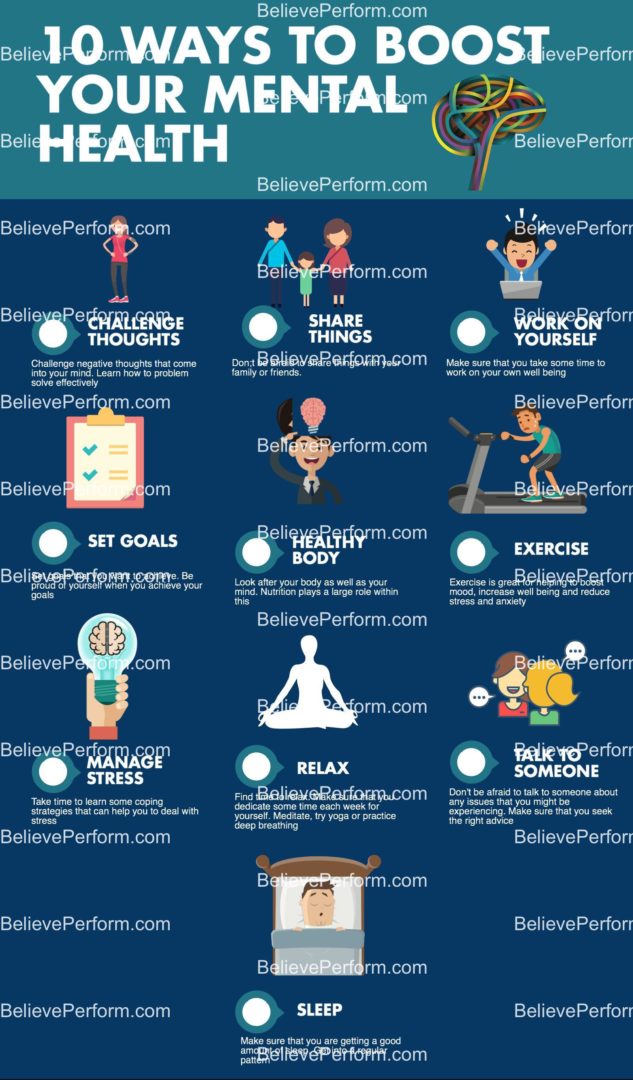Boosting Resilience: Strategies For Better Mental Health

Table of Contents
Cultivating a Positive Mindset
A positive mindset is a cornerstone of boosting resilience. Negative thoughts and self-criticism can significantly impact mental health, hindering our ability to cope with stress. By actively cultivating a more positive outlook, we can significantly improve our resilience and overall well-being.
The Power of Positive Self-Talk
Negative self-talk is a common hurdle in building resilience. Phrases like "I can't do this" or "I'm a failure" reinforce negative emotions and limit our ability to overcome challenges. Cognitive restructuring, a technique used in therapy, helps us challenge and reframe these negative thoughts. Instead of accepting negative thoughts as facts, we examine their validity and replace them with more realistic and positive alternatives.
- Positive Affirmations: Start your day with positive affirmations, repeating phrases like "I am strong," "I am capable," or "I can handle this."
- Self-Compassion Exercises: Practice self-kindness and understanding. Treat yourself with the same compassion you would offer a friend facing similar challenges.
Practicing Gratitude
Gratitude is a powerful tool for enhancing mental well-being and boosting resilience. Focusing on what we're thankful for shifts our perspective from negativity to positivity, fostering a sense of appreciation and contentment.
- Gratitude Journaling: Take a few minutes each day to write down things you're grateful for, big or small.
- Expressing Thanks: Verbally express your gratitude to others. A simple "thank you" can go a long way in strengthening relationships and boosting your own mood. This is an important aspect of stress management as well.
Mindfulness and Meditation
Mindfulness techniques help us become more aware of our thoughts and feelings without judgment. This increased awareness allows us to better manage stress and regulate our emotions, crucial components of building resilience. Meditation, a core element of mindfulness, can calm the mind and reduce anxiety.
- Mindfulness Exercises: Practice mindful breathing, focusing on the sensation of each inhale and exhale. Pay attention to your senses – what you see, hear, smell, taste, and touch.
- Guided Meditations: Numerous apps (like Calm or Headspace) offer guided meditations for beginners.
Building Strong Social Connections
Strong social connections are vital for building resilience. Social support acts as a buffer against stress, providing emotional comfort and practical assistance during difficult times.
The Importance of Social Support
Humans are social creatures; we thrive on connection. Having supportive relationships with family, friends, and community members provides a sense of belonging and reduces feelings of isolation, which is a major contributor to poor mental health.
- Nurture Relationships: Make time for loved ones, actively listening and offering support.
- Expand Your Network: Join clubs, groups, or volunteer organizations to meet new people and build connections.
Seeking Professional Help
Seeking professional help for mental health concerns is a sign of strength, not weakness. Therapists and counselors provide a safe and supportive space to process emotions, develop coping skills, and address underlying mental health conditions.
- Finding a Therapist: Many online resources can help you find mental health professionals in your area.
- Types of Therapy: Explore different therapeutic approaches, such as cognitive behavioral therapy (CBT) or dialectical behavior therapy (DBT), to find what works best for you.
Joining Support Groups
Connecting with others who share similar experiences can provide a sense of community, validation, and hope. Support groups offer a platform to share feelings, learn coping strategies, and receive encouragement.
- Online Support Groups: Numerous online forums and communities offer support for various mental health concerns.
- In-Person Support Groups: Check with local mental health organizations or hospitals for information on in-person support groups.
Developing Healthy Lifestyle Habits
A healthy lifestyle significantly contributes to boosting resilience. Physical activity, sufficient sleep, and proper nutrition support both physical and mental well-being.
The Role of Physical Activity
Exercise releases endorphins, which have mood-boosting effects. Regular physical activity reduces stress, improves sleep, and enhances overall mental health.
- Find an Activity You Enjoy: Choose activities that you find enjoyable and sustainable, such as walking, swimming, yoga, or team sports.
- Incorporate Movement into Your Day: Take the stairs instead of the elevator, walk during your lunch break, or do some stretching exercises at home.
Prioritizing Sleep
Sleep is crucial for physical and mental restoration. Insufficient sleep can impair cognitive function, increase stress, and negatively impact mood.
- Establish a Regular Sleep Schedule: Go to bed and wake up at the same time each day, even on weekends.
- Create a Relaxing Bedtime Routine: Wind down before bed with calming activities like reading or taking a warm bath.
Nourishing Your Body
A balanced diet plays a crucial role in brain health and mood regulation. Nourishing your body with wholesome foods provides the energy and nutrients needed to cope with stress and build resilience.
- Brain-Boosting Foods: Include foods rich in omega-3 fatty acids (salmon, walnuts), antioxidants (berries, dark chocolate), and B vitamins (leafy greens, eggs).
- Limit Processed Foods and Sugar: Reduce consumption of processed foods, sugary drinks, and excessive caffeine, as these can negatively affect mood and energy levels.
Conclusion
Boosting resilience is a journey, not a destination. By cultivating a positive mindset, building strong social connections, and developing healthy lifestyle habits, you can significantly improve your mental well-being and enhance your ability to navigate life's challenges. Start boosting your resilience today by incorporating these strategies into your life. Remember, prioritizing your mental health is crucial for a fulfilling and resilient life. Take the first step towards building better mental health by focusing on boosting your resilience.

Featured Posts
-
 The Impact Of Self Love On Vybz Kartels Skin Bleaching Decision
May 21, 2025
The Impact Of Self Love On Vybz Kartels Skin Bleaching Decision
May 21, 2025 -
 Wayne Gretzky And Donald Trump A Controversial Relationship And Its Impact On Gretzkys Legacy
May 21, 2025
Wayne Gretzky And Donald Trump A Controversial Relationship And Its Impact On Gretzkys Legacy
May 21, 2025 -
 Kahnawake Casino Owners Sue Mohawk Council And Grand Chief For 220 Million
May 21, 2025
Kahnawake Casino Owners Sue Mohawk Council And Grand Chief For 220 Million
May 21, 2025 -
 Doubters To Believers A Klopp Era Liverpool Fc Review
May 21, 2025
Doubters To Believers A Klopp Era Liverpool Fc Review
May 21, 2025 -
 Abn Amros Bonus Scheme Under Investigation By Dutch Regulator Risk Of Penalty
May 21, 2025
Abn Amros Bonus Scheme Under Investigation By Dutch Regulator Risk Of Penalty
May 21, 2025
